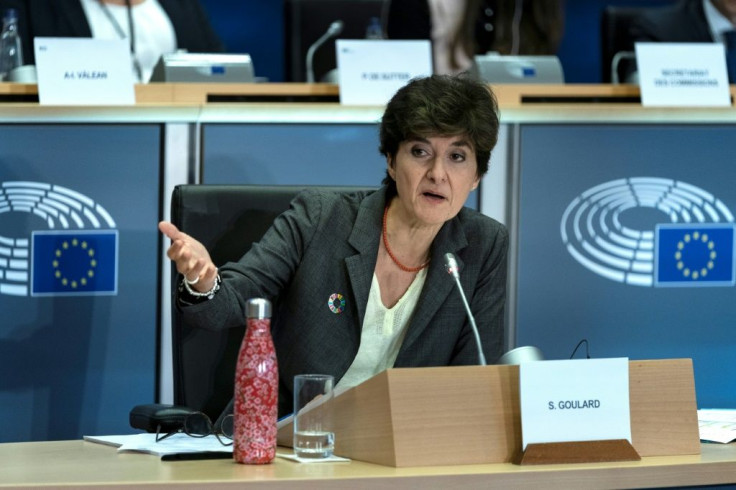Blow To Macron As His EU Top Job Pick Sent Home

European lawmakers on Thursday voted overwhelmingly against approving the candidacy of Sylvie Goulard, French President Emmanuel Macron's choice to join the European Commission as a top official.
The rejection is a major blow for Macron, who had made gaining influence in a post-Brexit European Union a key priority as the long dominance of German Chancellor Angela Merkel wanes.
The setback landed on the same day that Macron's pet project to introduce a stability budget for the eurozone single currency bloc was watered down dramatically.
Goulard, who faced two tense hearings by MEPs amid doubts over a series of scandals, was rejected by 82 votes to 29 and one abstention, several parliamentary sources told AFP.
Goulard was to have taken charge of a broad economic portfolio, but was the third nominee to be rejected during a marathon series of hearings where MEPs also sent picks from Hungary and Romania packing.
"I take note of the decision of the European Parliament, in respect for democracy," Goulard tweeted after the vote.
Incoming European Commission chief Ursula Von der Leyen was philosophical.
"I proposed 26 candidates; three didn't win a majority for various reasons. The Hungarian, Romanian and French nominations therefore remain open," she said in a statement.
A visibly furious Macron slammed the rejection, chalking it off to "petty" game-playing by MEPs, who had given assurances to Von der Leyen that Goulard would pass.
"I was told 'your nominee is great', and they take it, and now they finally tell me they don't want it anymore. I need that to be explained to me," Macron told reporters in the French city of Lyon.
He said Von der Leyen had herself picked Goulard from a list of three nominees and insisted that France still wants to take charge of the powerful portfolio she was to take on at the EU.
Goulard was set to take the reins of an unusually ambitious portfolio covering industrial policy, defence spending, high tech and space.
'I'm clean!'
While not unprecedented, rejections of candidates are usually reserved for inexperienced choices from eastern Europe and not from the EU's more influential founder members.
In 2004, in a rare exception, MEPs sent home Rocco Buttiglione, the nominee of then Italian prime minister Silvio Berlusconi.
The selection of Goulard, known in EU circles as a financial expert, had almost immediately stoked criticism.
A former MEP, Goulard resigned in June 2017 from a short stint as France's defence minister after being questioned by investigators in a ghost jobs scandal involving a parliamentary assistant.
The EU Anti-Fraud Office has also opened an investigation into the same case.
Both proceedings are ongoing, but Goulard has not been charged.
Doubts were also raised about Goulard's activities at the Berggruen Institute, a US-based think tank founded by German-American billionaire Nicolas Berggruen.
While she was an MEP, the institute paid her more than 10,000 euros a month for three years, raising the ire of her colleagues.
"I'm clean," a frustrated Goulard protested at her first hearing earlier this month in response to questions from MEPs about the ethics of her position.
Lawmakers saw it differently, angered that Goulard saw fit to seek office in Brussels while ongoing scandals exclude her from being a minister in France.
"The EPP Group (European People's Party) takes the integrity of our institutions very seriously and we could not support it," said Dutch MEP Esther de Lange, a conservative from the parliament's biggest party.
Macron must now nominate a new candidate, but it is not certain that he or she will be given the same portfolio.
The European Parliament is due to vote on the new 27-member commission at its next plenary session on October 24 in Strasbourg, France.
© Copyright AFP 2024. All rights reserved.











